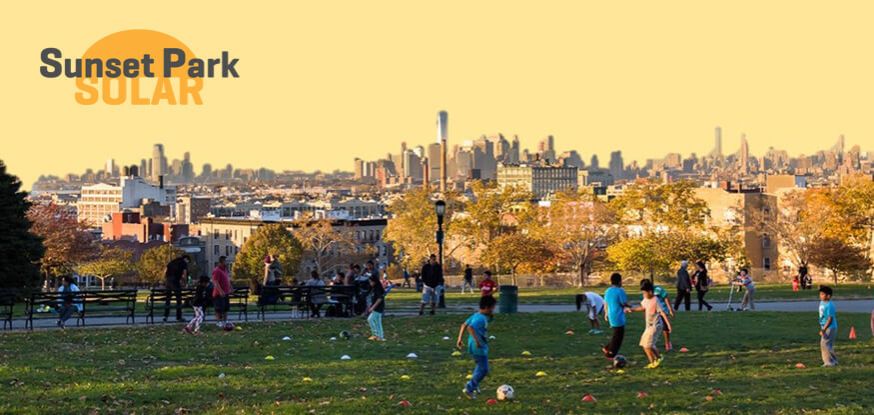The groundbreaking community solar project, Sunset Park Solar, is set to revolutionize Brooklyn, New York, aiming to reduce excessive air pollution and create climate resiliency in the neighborhood.
Spearheaded by the grassroots organization UPROSE, the solar initiative’s construction is set to begin early this year.
The 725-kilowatt solar installation atop the Brooklyn Army Terminal, a former military supply base, intends to lower energy bills for approximately 150 participating households in Sunset Park, a predominantly working-class neighborhood of Asian, Latino, and immigrant communities.
Elizabeth Yeampierre, Executive Director at UPROSE, stated, “For me, this is more than just renewable energy; it is a model of how we take control over our climate and economic future.”
Leveraging Collaboration for Strategic Initiatives
The project demonstrates a collaborative effort, with project developer Working Power co-owning the project.
Ultimately, the initiative will finance and build renewable energy systems in marginalized communities with the generated revenue from selling power to the grid directed to the community fund. This move will enable the residents to invest in local programs to expand solar initiatives.
In addition, the New York City Economic Development Corporation (NYCEDC) is leasing the space for 45,000 square feet of solar panels atop the renovated military base.
Cecilia Kushner, Chief Strategy Officer at NYCEDC, stated, “We want the Sunset Park district to be the premier testbed for a just energy transition, and that includes community solar projects.”
Driving Energy Bill Reductions
The project is expected to save participating households a combined USD 1.24 million, reducing utility bills by 20%. The project is set to benefit families amidst the rising energy expenses.
UPROSE highlighted that the solar array is expected to cost at least USD 2.7 million to construct, with partners exploring other financing options like grants, loans, and tax credits from the government and other sources.
With President-elect Donald Trump’s stated intentions to reduce clean energy spending and increase fossil fuel investments, Yeampierre emphasized the significance of the Sunset Park Solar: “The timing couldn’t be better for sending a message of what’s possible.”
Moreover, the solar initiative could provide a replicable model for equitable renewable energy development.
Driving Clean Energy Access
Solar community initiatives are gaining worldwide momentum, with nearly 7.9 gigawatts of United States community solar projects in operation as of June 2024, according to the National Renewable Energy Laboratory. These strategic projects include New York’s 1.8 GW installed capacity.
Supported by state policies and federal efforts such as the USD 7 billion Solar for All program, the total could potentially reach 14 GW by 2028, as forecasted by consulting firm Wood Mackenzie.
These community projects aim to provide access to environmental and economic benefits of solar energy, particularly for families unable to afford upfront installation costs.
Kate Daniel, Northeast regional director at the Coalition for Community Solar Access, emphasized the importance of community solar in addressing solar adoption issues and advancing New York’s goals for utility-scale solar, wind, and battery storage projects.
Additionally, New York achieved its 6 GW goal for distributed solar capacity a year ahead of schedule. “We’ve seen that community solar is scalable and deployable, whereas large-scale renewable energy programs have struggled to keep pace.”
Addressing Solar Market Challenges
While community solar projects have made significant strides in the participation of low-income residents, barriers such as steep enrollment fees and extensive credit score checks persist. Small-scale and community-driven initiatives also require higher levels of funding compared to corporate-owned arrays.
Nearly two dozen state and local governments have implemented policies to address these challenges, encouraging participation among low- and moderate-income residents. Developers can earn additional credits in New York for projects supporting disadvantaged communities.
The federal government funding of the Inflation Reduction Act further supported solar initiatives for low-income residents in every state.
Sixty selected programs are poised to receive grants and low-cost financing this year, including the Community Power Coalition’s USD 249.3 million, grant which will support more community-centered models similar to the Sunset Solar Park project.
For the Sunset Park Solar installation, UPROSE recently submitted a proposal to the Metropolitan Transportation Authority for larger community projects aiming to enroll 1,000 households in the neighborhood.
These initiatives demonstrate the need for widespread solar access in diverse communities while advancing climate tech solutions to drive a sustainable future.

